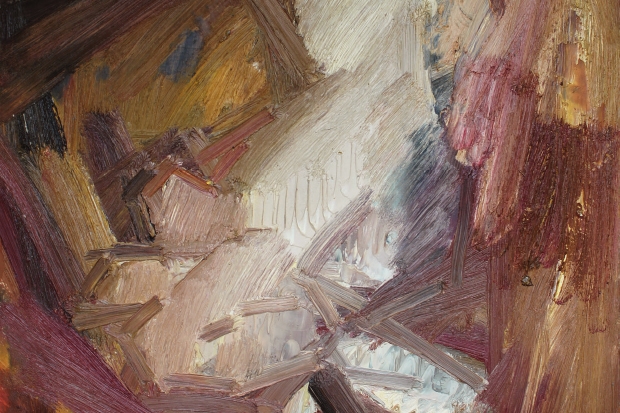The artist, according to Walter Sickert, ‘is he who can take a piece of flint and wring out of it drops of attar of roses’. In other words, whatever else it is — and all attempts at definition tend to founder — art consists in making something rare and memorable out of not very much.
Those words of Sickert’s popped into my mind as I looked at an exhibition of works by Avigdor Arikha at Marlborough Fine Art. Among these were pictures of a piece of toast, two pairs of socks, a casually folded orange tie, and part of a bathroom including a roll of toilet paper.
Arikha (1929–2010) was a French-Israeli artist based for much of his life in Paris. For 15 years he was an abstract painter, then in 1965 he abruptly began to depict the world around him. He turned to Alberto Giacometti one evening in the Bar du Dôme on boulevard Montparnasse and announced, ‘You were right!’
In post-war Europe, Giacometti had been the great proponent of figurative art. But while in London there were important painters — notably Freud, Bacon, Auerbach and Kossoff — who took that path, in late 20th-century France Arikha was a solitary figure, which may be why he is now in danger of being forgotten.
This is unfair. He was uneven, as many artists are, but he could attain a richly mysterious quality — especially when working only in velvety blacks and focusing on something extremely ordinary. Indeed, the more humdrum the subject the better; he succeeded much less well when depicting a famously glamorous film star — Catherine Deneuve — or the bodies of naked young women.
That boundary between figuration and abstraction was a crucial boundary in the 1950s and 60s — a sort of pictorial Iron Curtain. Some artists, like Arikha, switched sides after a dramatic conversion. Others found that very frontier fascinating. Frank Auerbach has spoken of how he felt the most exciting thing a painter could do was to cross the border from figurative to non-figurative, time and again, from one side to the other.
The same, perhaps, could be said of Auerbach’s exact contemporary, Dennis Creffield (born 1931), a selection of whose work over 60 years is on show at James Hyman Fine Art. A first encounter with a Creffield may suggest you are dealing with a gestural abstraction. In front of you are bold, scything brush strokes but few distinct forms. Then a look at the title reveals that this is in fact a view of Greenwich or a still life, and you look again — and begin to discern the subject.
Like Auerbach and Kossoff, Creffield attended classes by the charismatic painter David Bomberg. There are pictures here that instantly bring Bomberg to mind. But Creffield is not by any means a clone of his intense and brooding mentor. His work, after some gloomy panoramas of London in the 1950s, became more light, airy, and — an unusual quality, especially in post-war figurative art — joyous.
Robert Irwin is a West Coast American artist who comes from the same generation as Arikha and Creffield (he was born in 1928). His art, however, sidesteps the abstract/figurative dichotomy altogether. It is virtually immaterial. One work on show in 2 x 2 x 2 x 2, his exhibition at White Cube, Bermondsey, consists of two transparent, sharply angled columns. These are very close to being not there at all. From some points of view, you hardly notice them, from others they slice into your visual field or offer a tall thin band of reflection.
Another piece, ‘Black Painting’ (2015), consists of two squares with a surface of lacquered pigment so smooth they form twin mirrors. Again, when you look into them you see yourself, and the rest of the White Cube gallery, as in a glass darkly. Irwin has observed that you don’t need to worry about whether his work is art or not, ‘It’s just about what you are seeing or not seeing.’
Maybe — but, visually, this is close to a starvation diet. The other works by Irwin on show contrive to make neon tubes rather dim (and also stripy). A parallel exhibition by Cerith Wyn Evans, also at White Cube, consists of more neon tubes — one reproducing a motif from Duchamp, but drawn in light — suspended from the ceiling, plus revolving palm trees and a complicated glass thing that makes an eerie musical sound. This may not be the artistic equivalent of attar of roses, but it’s definitely more fun.






Comments